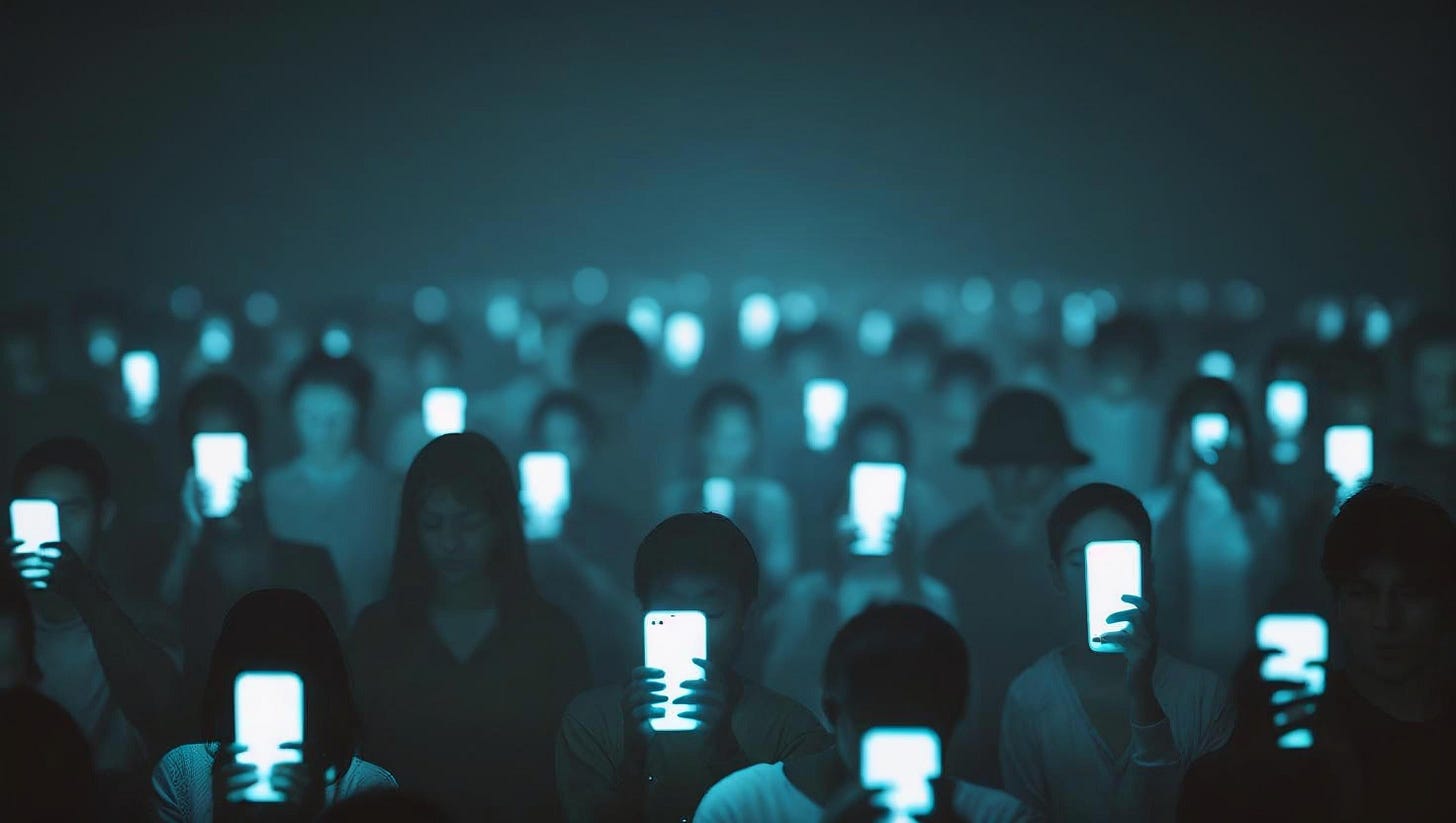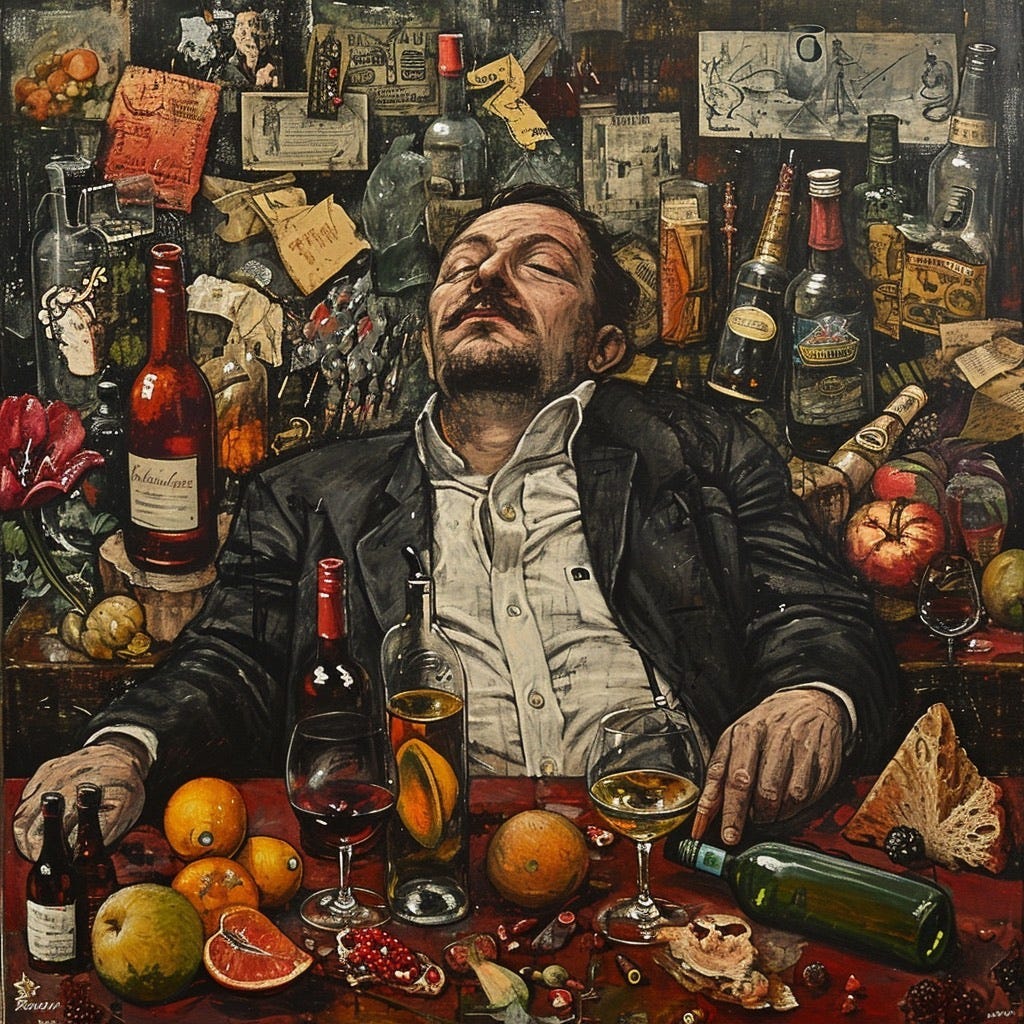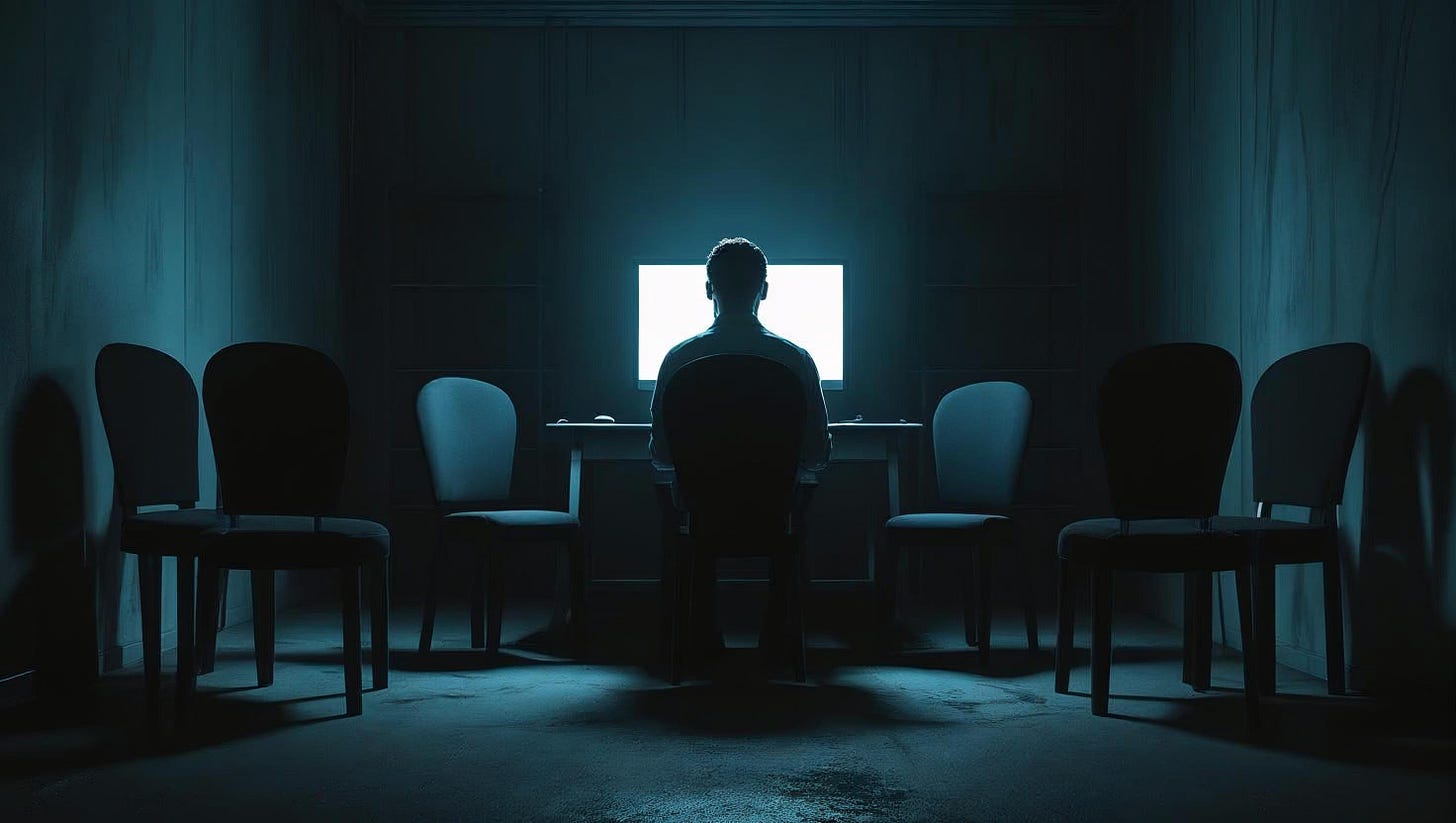Dopamine, Distraction, and Death
"Do you not know that your bodies are temples of the Holy Spirit, who is in you...? Therefore honor God with your bodies." 1 Corinthians 6:19–20
We Are Living in a Soma Society
Aldous Huxley’s Brave New World gave us a chilling prophecy not about fear and dictatorship, like 1984, but about comfort. He imagined a world where people didn’t need to be forced into submission. They simply stopped caring because they were constantly entertained. Today, our endless scrolling, quick laughs, and instant likes echo that same story.
But beneath all this comfort, something’s missing. People feel more anxious and lonelier than ever. We’re smiling on the outside, but many of us are spiritually empty. As Christians, we must ask: what’s numbing our souls, and how do we wake up?
What Is Soma and why does it matter?
In Brave New World, “soma” was a drug that erased sadness. If someone felt anxious or confused, they popped a pill and instantly felt better. It did not treat the underlying problem though, instead it only masked it for a short period. This created a vicious cycle… Perhaps you can see the parallels already.
Today, “soma” comes in many forms, a multi factored attack on the soul, constantly hitting from all angles and seeping into our very homes, the places that are supposed to be our reflective spaces. Social media, sex, drugs, alcohol, entertainment, politics, news, a 24/7 cycle that is inescapable for us. A cycle that creates dopamine dependency, addiction to pleasing our avatars; our bodies, instead of our souls.
Not many may feel sadness at an immediate level anymore, that is they do not feel it in front of their faces, there is always a distraction to bury it, but that is the point. That niggling feeling that something is missing, that something is not quite right rests among more people now than ever. It is the missing nourishment for the soul.
Never before did so many have access to such debauchery and hedonism. Never before did so many have access to sights and depravity reserved for the ultra-wealthy and detached. Young men are seeing women in increasingly hardcore acts within online pornography. Some now wake up with coffee, weed, or psilocybin, drugs once meant for spiritual awakening, now used for sedation.”. While others are watching children being blown to pieces in warzones via social media as they eat their breakfast cereal. All of these sensations, shock, bliss, and awe, all feed into a cycle of feeling. Feelings that are artificial, overstimulated, and disconnected from real experience
Huxley called soma “Christianity without tears”, referring to the drug replacing any feeling of grief, guilt, or tears, with pure bliss. No one chooses the hard road anymore. That makes free time feel empty, and spiritual growth through hardship is disappearing.
Let us now explore soma in the modern world.
Pills That Hide Pain
Medicine can be a gift. There is grace in healing, but when we use pills not to heal but to escape, we risk hiding the very pain that could have led us to truth. In Brave New World, people no longer mourned, wept, or wrestled with sorrow. They simply took soma. The result was not healing but hollow peace.
Huxley later warned in his non-fiction essays that “chemical persuasion” was becoming a real-world danger. He saw that society might one day choose sedation over self-awareness, and comfort over conscience. That warning is now reality. In many modern countries, prescriptions for antidepressants, sleep aids, and anti-anxiety drugs have skyrocketed not just for healing, but to keep us functional in a broken system.
This is not a blanket judgment on medicine. Some people truly need it. But many are medicated not because they are sick, but because their souls are starving, their lives are misaligned, and no one has told them how to suffer with purpose. Pain has become the enemy. But in Scripture, pain is often the beginning of wisdom.
“Blessed are those who mourn, for they shall be comforted.” – Matthew 5:4
God does not meet us where we pretend to be. He meets us in the depths. True comfort does not come from avoiding sorrow. It comes when sorrow is offered to God, and transformed in God’s hands or when we as vessels of the light persevere through it. The world tells us to numb it. Jesus invites us to name it, feel it, and let him walk with us through it.
Pain is not pointless. It is the threshold for growth, sometimes we need to feel it like any other sensation, sometimes we need to grieve.
Cannabis That Calms Without Healing
Cannabis is everywhere, rebranded and marketed for peace. While there is some potential for cannabis and hallucinogens such as psilocybin, it is as you the reader knows, often misused.
Globally, marijuana use has increased significantly alongside a wave of legal reforms. As of 2025, more than 50 countries have legalized cannabis in some form, either for medical use, recreational use, or decriminalization. Canada became the first G7 nation to fully legalize recreational cannabis in 2018, followed by countries like Uruguay, Thailand, Malta, and Germany. In Europe, Germany’s 2024 legalization marked a major shift, making it the continent’s largest legal cannabis market. South Africa, Mexico, and parts of Australia have also moved toward decriminalization or limited legalization.
According to the United Nations Office on Drugs and Crime, global cannabis use has risen by over 25% in the past decade, with approximately 209 million users worldwide. This trend reflects changing attitudes toward cannabis, driven by cultural normalization, potential economic gains, and growing belief in its medical value. However, it also raises new public health and regulatory challenges, especially in regions with weak enforcement or rapid commercialization.
As of 2025, the United States has over 15,000 legal cannabis dispensaries, with 79% of Americans living in a county that has at least one. California leads with around 3,659 dispensaries, making up roughly a quarter of the national total. New York has seen rapid growth, expanding from just 41 dispensaries in 2023 to 368 by early 2025 and issuing over 625 licenses, reaching $1 billion in total sales. National cannabis sales hit $31.4 billion in 2024 and are projected to rise to $44.3 billion in 2025 and over $53 billion by 2027. Cannabis now generates more than $20 billion in state tax revenue annually, surpassing alcohol.
While 37 states and Washington, D.C. have legalized marijuana in some form, states are also refining regulations; California now permits dispensaries to host lounges and events, while Texas and Connecticut are tightening rules on THC products and unlicensed sales. Notably, youth cannabis use has declined in most states post-legalization, and states like North Carolina are considering full legalization in the near future.
All this is to say, the use of cannabis is rising and the critical thinker asks why? Why in a world that is progressively slipping towards authoritarianism at the same relaxing laws around drug use?
The answer is sedation. Like soma, it offers calm without clarity, relief without repentance. In many cases, it quiets the very discomfort that might lead us to ask deeper questions about our lives. Peace without purpose is still sedation.
Scripture reminds us:
“Do not get drunk with wine, for that is debauchery, but be filled with the Spirit.” – Ephesians 5:18
Porn Promises Pleasure
Porn offers connection without commitment, pleasure without presence. But as Mary Eberstadt warns in Adam and Eve After the Pill (2013), porn does not free us, it fragments us. It rewires the heart to seek bodies, not souls. Like soma, it kills longing by feeding appetite.
Pornography use has risen sharply in recent years, fueled by smartphones, high-speed internet, and algorithm-driven platforms. As of 2024, over 90% of men and 60% of women in the U.S. report having viewed pornography, with the average age of first exposure now around 11 to 13 years old.
Major sites like Pornhub receive over 100 billion visits annually, and OnlyFans has grown to more than 220 million registered users and over 2 million creators, many of whom produce explicit content.
As access increases, so does extremity… Studies have shown that frequent users often seek more graphic or violent material over time, with one 2023 study reporting that over 30% of male users admitted escalating to content they previously found disturbing. This escalation can mimic patterns of addiction, rewiring reward systems and distorting expectations of real intimacy. Critics warn that widespread porn consumption is contributing to higher rates of sexual dysfunction, anxiety, and decreased relationship satisfaction, particularly among young men.
In today’s culture, where lust and physical pleasure are idolized, especially by Hollywood, porn trains people to replace human connection with digital simulation. Choosing a screen over a soul is more than just habit; it’s a kind of sacrifice. You offer your body and desire to a machine, and in doing so, give up something sacred. It’s no surprise that society now welcomes AI to shape our thoughts, when many have already surrendered one of the most powerful human instincts to technology without protest. When sex becomes artificial, the soul becomes easier to program.
What was once considered taboo is now deeply embedded in digital culture, raising profound questions about the long-term effects on the soul, the body, and human connection…
Remember, true intimacy instead comes through love for others and for God, not through using others for pleasure. Those who train their bodies to respond only to pixels and private gratification, are surprised when they feel numb in the presence of a real person. It is impossible to build connections while feeding habits that destroy it.
Jesus calls us to a different gaze:
“But I tell you that anyone who looks at a woman lustfully has already committed adultery with her in his heart.” – Matthew 5:28
Entertainment That Never Stops
Sports obsession, celebrity gossip, TikTok trends, these are our modern gladiator games. Like the Romans, we cheer and scroll and laugh, while our cities and souls’ decay. Huxley warned that a world addicted to amusement forgets how to feel.
YouTube. Netflix. Endless reels. It never stops, this constant flow of fun is “a soft drug,” numbing our minds and hearts. Stillness brings truth. Noise often hides it. Constant external stimuli prevent us from looking inward and discovering ourselves and the light within.
“Be still, and know that I am God.” – Psalm 46:10
Shopping as a Cure for Sadness
When we’re sad, we shop. At least, that’s what our culture says. Huxley’s society used shopping as distraction, buying things instead of facing emptiness.
This rising consumerism and fast fashion have transformed identity into a product and desire into a business model. For example, the fashion industry now produces over 100 billion garments per year, doubling since 2000 across the globe. The average consumer buys 60% more clothing than they did 20 years ago but keeps each item for half as long. Brands release new collections weekly, creating a culture of constant trend-chasing and disposability.
This comes at a steep cost to both the earth and our soul: the fashion industry i produces 20% of the world’s wastewater, making it one of the most polluting industries on earth. Worse than our disrespect for Eden… Behind the scenes, workers, often women and children, are paid less than $3 a day in unsafe conditions to feed the system. Every purchase we make commits a sin through unfairness and impacting people’s freedoms.
Fast fashion promises individuality, but delivers exploitation and environmental decay. It turns shopping into a coping mechanism, a way to fill spiritual emptiness with material distraction.
As Jesus said, “Do not store up for yourselves treasures on earth... But store up treasures in heaven” - Matthew 6:19–20.
You weren’t made to consume endlessly. You were made to become whole.
Fake Spirituality
Crystals. “Good vibes.” Manifesting. Magic. These trends are packaged as spiritual and harmless, but they often run shallow or are practiced without understanding or discernment. For centuries, those who engaged in occult, hermetic, or magical acts did so in secrecy, often on the fringes of society. Today, these same practices are celebrated and promoted across social media; stripped of caution, context, or reverence. People joke about summoning spirits, recite affirmations with hidden magical meanings, and casually speak into “the universe” without realizing the spiritual forces they may be invoking.
What was once guarded as dangerous is now dressed up as self-help. It has been rebranded as healing, awakening, and empowerment. But the truth is those unaware may be releasing something that cannot be returned. Awareness of these practices is so widespread akin to Pandora’s box being opened. And most are not in control of what comes out.
These methods are often practiced carelessly and offer no real guidance to those who are truly searching. They promise healing but deliver only temporary relief, a spiritual bandage that delays the deeper work of transformation. It’s a quick fix that kicks the pain further down the road, leaving souls still restless, still lost.
“My people have committed two sins: they have forsaken me, the spring of living water, and have dug their own cisterns, broken cisterns that cannot hold water.” - Jeremiah 2:13, NIV
Work That Never Ends
Busyness has become a badge of honor. In Brave New World, people didn’t have time to think because their lives were carefully filled with noise, tasks, and engineered pleasures. Today’s hustle culture mirrors this. Over 55% of workers globally say they are "burned out" at their jobs, and nearly 70% of Gen Z say their mental health is affected by constant performance pressure. We wear exhaustion like a trophy and mistake productivity for purpose.
Even God rested. The Creator of the universe paused not because he was tired, but to teach us that rest is sacred. Without Sabbath, we lose sight of eternity. In a society that glorifies grinding, rest becomes a kind of rebellion.
“Come to me, all you who are weary and burdened, and I will give you rest.” – Matthew 11:28
Rest isn’t laziness. It’s a spiritual practice, especially meditation that will be covered in another article. When the world tells you to hustle harder, Christ invites you to lay down your burden and remember who you are; not a machine but a soul.
Technology That Watches You
Your phone doesn’t just serve you; it studies you. Every swipe, scroll, and search feeds the algorithm. Today, the average person touches their phone over 2,600 times a day and spends more than 7 hours daily on screens. Algorithms don’t just track what you like; they shape what you see, what you believe, and even how you vote.
Like Huxley’s vision, we aren’t oppressed by force but lulled into compliance by entertainment. Attention has become the new currency, and surveillance the new shepherd. What we see online isn’t the truth it’s a carefully crafted feed designed to keep us comfortable and distracted.
“It is for freedom that Christ has set us free.” – Galatians 5:1
Freedom doesn’t come through unlimited access or endless options. It comes through clarity. Through knowing who you are and what you serve. In a world of digital noise, reclaiming silence is an act of faith.
A World That Treats You Like a Child
We live in a culture that avoids maturity. Hard truths are softened, deep thinking is rare, and serious conversations that are confronting are often labelled as "toxic." In schools across the West, the number of hours spent on moral philosophy, religious studies, and critical debate has declined by more than 40% in the last two decades. Meanwhile, screen time among children and teens is at a record high, over 8 hours a day, often spent on bite-sized entertainment.
Brave New World warned of this. The people were not oppressed with chains, but sedated with pleasure. They were kept in a state of emotional childhood: entertained, indulged, and protected from grief. But God calls us to grow and to move beyond surface living into spiritual depth.
“When I was a child, I spoke like a child... but when I became a man, I put away childish things.” – 1 Corinthians 13:11
Christ doesn’t keep us small. He calls us higher. He invites us to put away distraction, to face suffering, and to grow in wisdom and holiness. In a world that rewards immaturity, spiritual adulthood is an act of rebellion.
There is good news though.
While soma offers sedation, many are choosing the path of sanctification.
In defiance of a culture that numbs, surveils, and distracts, more people are turning to God. From 2024 into 2025, signs of a modern Christian revival have emerged across the UK, the U.S., and among Gen Z globally.
In the United Kingdom, Church of England attendance has risen to over one million regular worshippers, prompting a historic £2.2 billion investment into mission and ministry. Urban churches like St Margaret’s in Canning Town are overflowing, drawing thousands each week, many of them under 35.
In the U.S., the 2023 Asbury Revival sparked a national awakening, with more than 50,000 people gathering for two weeks of spontaneous prayer and worship. Since 2021, nearly 30 million more Americans have made a personal commitment to Christ, according to Barna's latest data.
Globally, Pentecostal and Charismatic movements continue to expand rapidly. These traditions now include over 300 million believers, with tens of thousands converting daily. Meanwhile, Gen Z is quietly leading a spiritual revolution, organizing campus worship nights, rediscovering Scripture, and rejecting the hollow promises of secularism in favour of something real.
Recent data reflects this surprising and encouraging trend: younger generations are returning to church. In the UK, monthly church attendance among 18–24-year-olds has risen from just 4% in 2018 to 16% by 2025. For young men in that age group, it has climbed to 21%. In the U.S., around 24% of Gen Z (ages 18–24) now attend weekly religious services, surpassing both Millennials and Gen X in some areas. Barna reports that 39% of Millennials now worship weekly, nearly doubling from 21% in 2019. These figures suggest a growing spiritual hunger among young adults, with many seeking truths, meaning, and belonging in places their generation was once expected to abandon.
It is a rediscovery of God's presence in a world saturated with distraction; an escape from the devil’s panopticon.
The light is growing while the shadow retreats.
God bless,
Charles
“The light shines in the darkness, and the darkness has not overcome it.” – John 1:5













